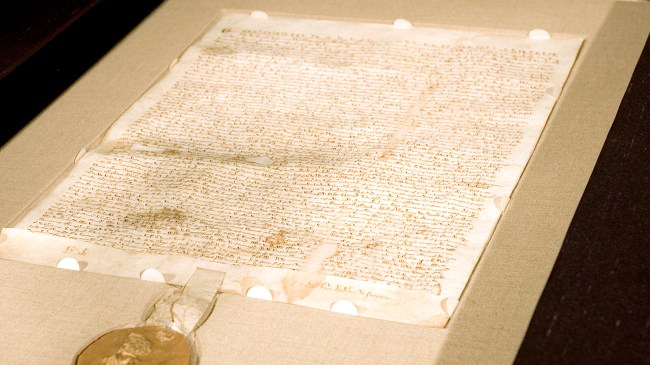Getty Image
The Magna Carta was a landmark legal document responsible for shifting the balance of power away from the kings who had spent centuries ruling England with an iron fist when it was published in 1215. An updated version was issued at the start of the 14th century, and Harvard recently discovered it has one of the original copies of that iteration in its possession after dropping $27 on what was initially believed to be a reproduction.
English history is filled with conflicts stemming from friction between monarchs and their subjects, and in 1215, barons who rebelled against King John used the Magna Carta to air their grievances against the crown while pushing for reforms linked to taxes, criminal punishment, and religious freedom.
The original Magna Carta was essentially a peace treaty that was initially rejected. However, it served as the foundation for the charter that John’s son, Henry III, eventually agreed to, and the document is widely credited with significantly altering the country’s political landscape.
There are just four copies of the original Magna Carta still in existence; two are in the possession of the British Museum, while the others are under the purview of two cathedrals located in England.
In 1300, Edward I endorsed an updated version of the Magna Carta, and as of a couple of years ago, there were only six verified original copies of that document accounted for. However, that number has grown to seven thanks to a fairly unexpected discovery at Harvard University.
According to The New York Times, Harvard acquired what was positioned as a reproduction of the 1300 version of the Magna Carta from a book dealer in London in 1945 for $27.50 (around $500 when adjusted for inflation).
The document remained stashed in the archives at Harvard Law School before David Carpenter, a medieval history expert who teaches at King’s College in London, came across it while browsing the institution’s digital collection and realizing it had all the hallmarks of an original copy.
Carpenter quickly reached out to Nicholas Vincent, who teaches the same discipline at the University of East Anglia, and his colleague came to the same conclusion after looking at the picture. They subsequently contacted Harvard, which ran forensic tests on the document while comparing it with the other original copies in existence before confirming it was also created more than 700 years ago.
Harvard says it has no plans to sell the artifact, but as the outlet notes, it would likely fetch a very hefty sum if it hit the market when you consider one that changed hands in 2007 sold for $21.3 million.
Content shared from brobible.com.

